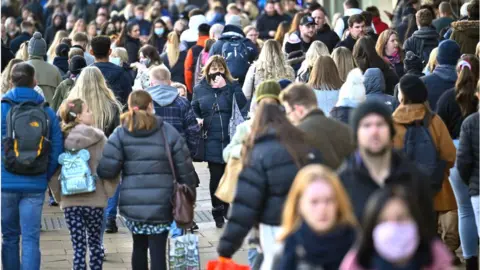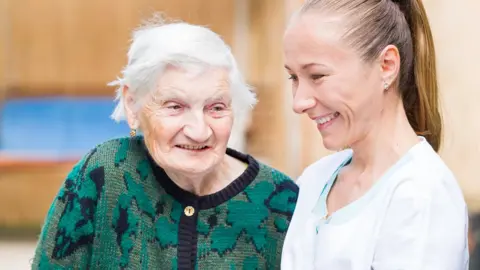Scotland's population projected to peak in 2028
 Getty Images
Getty ImagesScotland's population looks likely to fall after reaching a peak in 2028, according to research by National Records of Scotland (NRS).
The records authority believes that the population will rise slightly to 5.48m in 2028 before falling to 5.39m by 2045.
The first projections for several years show a trend for lower birth rates as the catalyst for the drop.
There are currently 5.47m people living in Scotland.
Looking at past trends in births, deaths and migration, NRS predicts that by 2045 there will be 200,000 fewer children (a fall of 22%) and 300,000 more people over 65 (an increase of 30%).
If the projections from NRS are realised, Scotland's population will fall by 1.5% over the next 25 years, while the UK population will grow by 5.8%.
The NRS report is based on data from the Office for National Statistics (ONS).
NRS head of population and migration statistics Esther Roughsedge said: "Birth rates have been falling steadily for a number of years.
"Lower birth rates are the main reason these projections are lower than previous ones."
 Getty Images
Getty ImagesShe said life expectancy had stalled since 2012-2014, and that Covid-19 has had some impact.
"But most of the projected change is due to longer-term trends showing more deaths than births each year," she added.
"As has been the case since mid-2001, more people are projected to move to Scotland than leave each year, but beyond 2028 this will no longer offset the gap between births and deaths.
"This is the main reason for these figures showing Scotland's population peaking in the next decade before falling."
'To be celebrated'
Projections are used as a guide for those involved in planning services for the future.
A fall in the number of children and more older people will change the pattern of demand for services like schools, health and social care.
Age Scotland said the projections meant that urgent action was needed to make Scotland fit for the future.
The older people's charity wants more done to ensure a dignified standard of living in later life for all.
Chief executive Brian Sloan said: "Even before the pandemic, our health and social care services faced immense pressure and now they're being stretched to breaking point.
"If we are to deliver on the healthcare needs of older people both now and in the future, more investment and resources will be needed to ensure older people can access what they need, when they need it.
"With the number of people in Scotland living with dementia expected to rise, it's vital that we see support and services improved to help those affected live well. This must also include greater support and recognition of unpaid carers, which will be likely to increase."
 Getty Images
Getty ImagesHe pointed out that a third of the Scottish workforce was already over 50 and this figure would grow. He said the workplace should become more age friendly.
"With years of experience and transferable skills, older workers have a huge contribution to make and must have access to a greater degree of support, but ageism and a lack of flexible working means that many valuable people are left behind," he added.
He called for more future-proof adaptable housing stock.
Robin Maynard from the campaign group Population Matters said the news should be welcomed.
He said: "Ignore the familiar alarmist warnings of 'economic collapse' from old school economists and those putting short-term profit before long-term wellbeing.
"More people enjoying longer, healthier lives and a younger generation making the responsible, ecological choice to have smaller families is to be celebrated."
He said a smaller population meant "less of the bad stuff" including traffic congestion, pollution, and competition for housing and schools.
